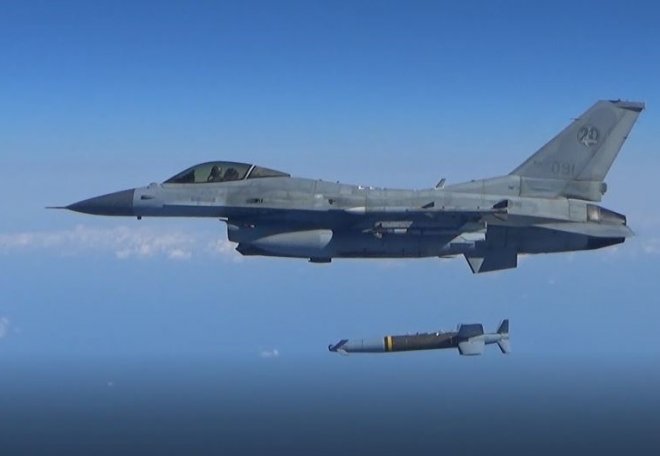
South Korea blasted North Korea’s latest barrage of missiles, particularly one that crossed a disputed maritime border and landed near a South Korean island, prompting sirens on the island to wail and residents to seek shelter Wednesday morning.
Though the short-range ballistic missile landed more than 100 miles (160 km) away from the South’s eastern island of Ulleungdo, it was the first rocket launched by North Korea that crossed the disputed Northern Limit Line maritime border between the Koreas since the 1950-53 Korean War, the South Korean military said.
In response, South Korean warplanes fired three precision strike air-to-surface missiles of their own about 16 miles north of the line, the same distance that the North’s landed south of it.
"North Korea"s missile launch, which marks the first time since the division of the peninsula that it has landed near our territorial waters south of the NLL, is very rare and intolerable," the South Korean Joint Chiefs of Staff, or JCS, said in a statement.
The missile was one of 23 that Pyongyang launched into waters east and west of the Korean Peninsula, the most ever in a single day, according to the South’s military. The North also fired more than 100 rounds of artillery into a military buffer zone, the military said.
"Our military"s response reaffirms our resolve to sternly respond to any provocations (by North Korea) and shows that we are capable of accurately striking our enemy," the JCS said.
The South Korean government strongly condemned Wednesday’s launches, which are violations of U.N. Security Council resolutions and military agreements made between the two Koreas at summits in recent years, Kim Seong-han, the presidential office’s national security advisor, told reporters.
“I think it is especially deplorable that [this provocation] was carried out during a national period of mourning in South Korea,” he said, referring to the tragic loss of more than 150 lives over the weekend caused by overcrowding during Halloween celebrations in Seoul’s Itaewon neighborhood.
According to data from the Netherlands-based BNO News, the barrage represented 11 percent of the total number of missiles launched by North Korea since 1953.
“This barrage from North Korea is not just about refining its missile arsenal,” Jean H. Lee, a veteran journalist who opened and once led the Associated Press’ Pyongyang bureau, said on Twitter.
“Pyongyang is also on a campaign to provoke anxiety in South Korea by raising tensions at a time when the country is in mourning. Could the intention be to fuel anger toward the current government?” she said.
South Korea’s Foreign Ministry said in a news release that Foreign Affairs Minister Jin Park and U.S. Secretary of State Antony Blinken denounced North Korea’s launches during a phone call.
The launches did not pose an immediate threat to the U.S. or its allies, the U.S. Indo-Pacific Command said in a statement.
“The missile launches highlight the DPRK’s reckless behavior and the destabilizing impact of its unlawful WMD and ballistic missile programs,” it said, adding that the U.S.’ commitments to defending South Korea and Japan are “ironclad.”
Japanese Prime Minister Fumio Kishida told reporters Wednesday that he intended to convene a National Security Council as soon as possible, given the heightened tensions on the Korean Peninsula.
Chinese Foreign Ministry spokesperson Zhao Lijian told reporters that Beijing was closely following the situation.
“It is in the common interest of the region to maintain peace and stability in the peninsula, and resolve each other"s concerns in a balanced manner through dialogue and consultation,” he said, adding that China hopes all concerned parties would work toward a “political settlement” and prevent a “spiral of escalation of the situation.”
RFA Korean contributed to this report.
